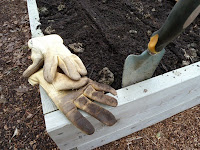Gardens, Soil and Beneficial Microorganisms
By Clifford WoodsMicroorganisms, microbes or bacteria make nutrients available in the soil for plants in a form that the plants then can use. Microbes create some of those nutrients, Mother Nature creates hers and we add the rest.
Some microbes consume nutrients and some microbes eat the microbes that have consumed the nutrients. This in turn breaks the nutrients down into a smaller form so they can be absorbed much more efficiently by the plant.
Microbes perform different jobs. Some defend against non-beneficial microbes and this helps keep the plant’s natural defence system at it's best. Some microbes can also convert nitrogen gas in the air into a form that the plants can use.
Microorganisms release different types of proteins, acids, enzymes and other essential elements. These elements help to break down trace minerals, micro and macro-nutrients and make it available as food for the plant. What happens is an extreme increase in root mass, which in turn increases the nutrient intake that creates bigger yields. Enzymes and anti-microbial substances are particularly crucial in plants.
Beneficial microorganisms can also help condition and aerate soil, and create a better drainage system. Some beneficial microorganisms also have the ability to break down toxins in the soil or soil-less mix and turn it into plant food, air and water. They also covert calcium and phosphate into something that plants can actually use.
A good rule of thumb as to which microorganism is beneficial and which is not is the harmful or pathogenic microorganisms cause putrefaction and beneficial microorganisms cause fermentation.
Types of Beneficial Microorganisms:
- Lactic acid: make lactic acid from sugars or other carbohydrates. This is an important by-product because it can act as a strong fertilizer. It will control or push down non-beneficial or harmful microbes as well as cause rapid decomposition of organic matter and ferments organic matter without the smell and other harmful outcomes.
- Photosynthetic: these take harmful products like hydrogen sulfide and make them into useful substances. With the help of sunlight, secretions from organic matter can also be made into amino acids, nucleic acids, and bio-active substances. These aid tremendously in the growth of a plant and it’s development. Amino acids are the basic building blocks of proteins. Synthesis of new protein is what Nucleic acids are responsible for and this allows the characteristics of an organism to transfer from one generation to another. Bio-active substances are important in the regulation of the function of both plants and animals, which include hormones, enzymes, and neurotransmitters, among others.
- Fermenting fungi: these groups of microorganisms suppress bad odors and prevent plant infestation by harmful insects and maggots. They also decompose organic matter rapidly to produce alcohol, esters and anti-microbial substances.
- Yeasts: these create a better root system and helps with the absorption of more water and nutrients from the soil. This will in turn speed up plant growth, producing more and wider leaves so the plant will produce starch. Plants use glucose as energy; but starch can be stored more efficiently and for longer periods of time.Plants use the sun for energy so at night the plants convert the stored starch back to glucose to provide the basic energy needed to maintain basic cellular functions.
- Do not use chemical fertilizers: fertilizers are made up of salts, and salts suck the water out of the microbes, which will either kill them or cause them to go into a dormant state.
- Do not use hydrogen peroxide (H2O2): this adds oxygen to water, lowers algae levels and can help suppress diseases within plants. It helps sterilize water and the growing medium to kill harmful microorganisms, but it will also kill the beneficial microorganisms. Not good.
- Do not use chemical pesticides: these get sprayed onto leaves to kill harmful insects, but they also kill the beneficial microbes that are present on the leaves. The pesticides then drip off the leaves and into the soil and again, kill any beneficial microbes present in that soil or soil-less mix.
- Don't walk on the soil or compact it: over-tilling and compaction can kill some beneficial microbe populations since some microbes need air to survive. Worms can do the work of turning it in for you.
Beneficial microorganisms bring back the lost properties of the soil and are commonly used in natural farming and organic gardens.
Clifford Woods is the CEO of Effective Environmental Services and Organic Environmental Technology.
We brew Beneficial Microorganisms that eat toxins and offer Environmentally Friendly Products.

